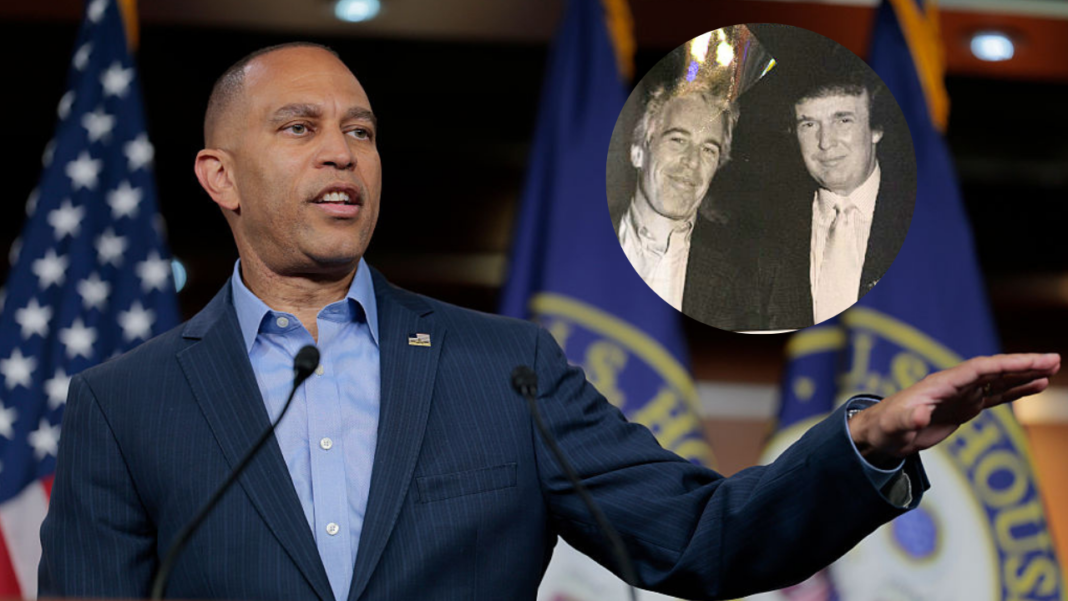Hakeem Jeffries Challenges Republicans Over Epstein Files
U.S. Representative Hakeem Jeffries, the Democratic leader of the House of Representatives, has taken a bold stance against his Republican counterparts, criticizing them for their reluctance to release FBI files related to the notorious convicted sex trafficker, Jeffrey Epstein. Jeffries’ remarks came during an interview with Jen Psaki on MSNBC’s “The Briefing,” where he articulated strong concerns about ongoing efforts to keep these sensitive documents under wraps.
“Mike Johnson and this group continue to cover up for the pedophiles. That’s crazy,” Jeffries stated, emphasizing the urgency and gravity of the situation. Epstein’s connections, particularly to high-profile individuals like former President Donald Trump, have made the release of these files a contentious political issue.
The Stakes of the Vote
The vote to unseal Epstein’s files is not just a matter of transparency; it’s a political hot potato for Republicans, who face scrutiny over the billionaire’s past associations with Trump. During the 2024 presidential election campaign, Trump had promised to release these FBI files, a pledge that now weighs heavily on his party. This ongoing standoff raises questions about Republican motivations and accountability, as many see the refusal to act as a protective measure for Trump and his allies.
Epstein’s Controversial History
Jeffrey Epstein’s legal troubles began escalating in 2008 when he was convicted on state charges for soliciting minors for prostitution. He served just over a year in prison and was released under controversial circumstances. In 2019, he faced federal charges for sex trafficking of young women and, tragically, died by suicide in jail before he could stand trial. The cloud of mystery surrounding his death adds layers of complexity to the ongoing discussions about transparency and legal justice.
The situation took another turn when the Department of Justice issued a memo stating that the Epstein files would not be released, even asserting that a purported client list did not exist. This decision has ignited further debate and suspicion among many who believe there is more to be disclosed.
Political Maneuvering and Legal Challenges
In a recent article, the Wall Street Journal revealed a disturbing letter allegedly written by Trump to Epstein for his 50th birthday in 2003, which contained suggestive undertones. Trump has denied its authenticity, despite the letter bearing his signature. In response, he filed a $10 billion defamation lawsuit against the publication, claiming it has misrepresented his connection to Epstein.
Questions surrounding the FBI’s findings have not been quelled. During a Senate Judiciary Committee hearing, Trump’s then-Attorney General Pam Bondi was pressed by Senator Sheldon Whitehouse regarding reports that Epstein had photographs of Trump with “half-naked young women.” Bondi’s refusal to comment only heightened suspicions about the extent of Epstein’s interactions with Trump and the possible implications for the former president.
A Legislative Standstill
Currently, the House of Representatives sits just one vote shy of achieving a majority that would force a vote on releasing the Epstein files. The recent election of Democrat Adelita Grijalva from Arizona could provide that crucial 218th vote; however, Republican Speaker Mike Johnson is being accused of deliberately delaying her swearing-in. This legislative gridlock has persisted amid a government shutdown, with the House out of session since September 19.
Jeffries articulated the frustrations many feel about this political impasse, stating, “We all know this is about the Epstein files and the fact that Republicans on The Hill for months have been doing Donald Trump’s bidding and trying to hide these Epstein files from the American people.” Victims of Epstein’s crimes have expressed a strong desire for full transparency, arguing that accountability cannot be obtained if the files remain concealed.
The Future of the Epstein Files
As the House grapples with this complex issue, the stakes are high. Jeffries pointed out that Grijalva has made it clear she would support a discharge petition aimed at forcing a vote on the Epstein files. This commitment underscores the Democrats’ push for accountability, further intensifying the already contentious atmosphere in the House.
While the resolution of this issue remains uncertain, the political repercussions are palpable. The lines are drawn, and the question of whether the American public will ever get a glimpse into the murky dealings associated with Epstein continues to linger in the air.



